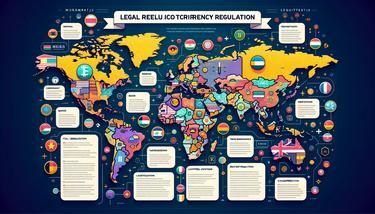Legal regulation of cryptocurrencies by countries
The legal regulation[1] of cryptocurrencies[2] varies significantly from one country to another, reflecting a diverse approach to digital currencies[3] across the globe. This document provides an overview of how various countries regulate cryptocurrencies, highlighting the spectrum from strict regulation to embracing innovation.
- Regulatory Approaches
- Countries with Strict Regulations
- Countries with Progressive Regulations
- The Middle Ground
- Key Facts
- Legal regulation of cryptocurrencies by countries
- European Union (EU)
- United States (USA)
- Canada
- China
- Japan
- Korea (South Korea)
- Hong Kong
- Singapore
- India
- United Arab Emirates (UAE)
- Russia
- Kazakhstan
- Turkey
- Georgia
- El Salvador
- Latin America
Regulatory Approaches
Countries adopt different regulatory approaches towards cryptocurrencies, ranging from outright bans and stringent regulations to creating friendly ecosystems for cryptocurrency[4] innovation and use.
Countries with Strict Regulations
Some countries have implemented strict regulations or outright bans on the use or trading of cryptocurrencies. For example, China has banned cryptocurrency exchanges and initial coin offerings (ICOs), while also cracking down on cryptocurrency mining[5].
Countries with Progressive Regulations
On the other end of the spectrum, countries like Switzerland and Estonia are known for their progressive and supportive stance towards cryptocurrencies and blockchain[6] technology. These countries offer clear legal frameworks that foster innovation and growth within the crypto sector.
The Middle Ground
Many countries fall somewhere in the middle, adopting cautious yet optimistic regulatory frameworks that aim to balance the potential risks and benefits of cryptocurrencies. Countries like the United States and Canada have established regulatory guidelines that provide some clarity, though the landscape remains complex and fragmented.
The global landscape of cryptocurrency regulation is complex and rapidly evolving. As digital currencies continue to gain popularity, it is likely that more cohesive and comprehensive regulatory frameworks will emerge, shaped by the need to protect consumers while fostering innovation and financial inclusion[7].
Key Facts
- Countries vary widely in their regulatory approaches to cryptocurrencies, from outright bans to supportive legal frameworks.
- China is known for its strict regulations against cryptocurrency trading and mining.
- Switzerland and Estonia are examples of countries with progressive regulations supporting cryptocurrency innovation.
Legal regulation of cryptocurrencies by countries
European Union (EU)
The EU has been moving towards harmonizing cryptocurrency regulations across its member states. The Markets in Crypto-Assets (MiCA) framework aims to provide regulatory clarity[8] on cryptocurrencies, ensuring consumer protection[9], market integrity, and financial stability[10]. MiCA focuses on transparency[11], authorization, and supervision of crypto asset services providers across the EU.
United States (USA)
In the USA, the legal status[12] of cryptocurrencies is complex, involving multiple regulatory bodies. The Securities and Exchange[13] Commission (SEC) oversees crypto assets considered securities, while the Commodity Futures Trading Commission (CFTC) has jurisdiction over crypto commodities. The Financial Crimes Enforcement Network (FinCEN) focuses on anti-money laundering (AML) aspects. Regulations can also vary by state.
Canada
Canada recognizes cryptocurrencies for taxation purposes and as a form of investment. The Canadian Securities Administrators (CSA) provides guidelines for cryptocurrency exchanges, treating them similarly to securities exchanges. Canada has a relatively progressive stance towards cryptocurrencies but emphasizes regulatory compliance[14] for anti-money laundering and counter-terrorist financing.
China
China has taken a strict stance against cryptocurrencies, banning all crypto transactions and mining activities. The People’s Bank of China (PBoC) considers cryptocurrencies illegal, focusing on promoting its digital currency[15], the Digital Yuan, as a controlled alternative.
Japan
Japan is known for its crypto-friendly regulatory environment[16], recognizing cryptocurrencies as legal property under the Payment Services Act. The country has a registration system for cryptocurrency exchanges to ensure compliance[17] with AML and CFT laws.
Korea (South Korea)
South Korea has a vibrant cryptocurrency market, with regulations focusing on transparency and consumer protection. Exchanges are legal but must register with the Financial Services Commission (FSC) and adhere to strict AML guidelines.
Hong Kong
Hong Kong has a more liberal approach to cryptocurrencies, allowing exchanges to operate if they register with the Securities and Futures Commission (SFC) and comply with AML/CFT regulations. The region aims to become a crypto hub while ensuring financial security and integrity.
Singapore
Singapore is proactive in creating a conducive environment for cryptocurrencies, regulated by the Monetary Authority of Singapore (MAS). The Payment Services Act provides a framework for cryptocurrency exchanges and payment services, focusing on consumer protection and financial stability.
India
The legal status of cryptocurrencies in India has seen fluctuations, with the Supreme Court overturning a previous ban by the Reserve Bank of India (RBI). However, the government has proposed introducing a digital currency and regulating private cryptocurrencies rather than banning them outright.
United Arab Emirates (UAE)
The UAE, particularly Dubai, is aiming to establish itself as a cryptocurrency hub. Regulations vary across the UAE, with Dubai introducing the Dubai Virtual Asset Regulation Law to regulate crypto assets and service providers.
Russia
Russia has a complicated relationship with cryptocurrencies, recognizing them as property for tax purposes but prohibiting their use for payments. The country is exploring the development of a digital Ruble and regulating crypto activities more comprehensively.
Kazakhstan
Kazakhstan has become a hotspot for cryptocurrency mining due to its low energy costs. The country has introduced regulations to oversee mining activities and ensure they comply with financial and energy consumption[18] norms.
Turkey
Turkey has seen widespread adoption of cryptocurrencies among its population. The government has announced plans to establish a legal framework for cryptocurrencies, focusing on market oversight and preventing fraud.
Georgia
Georgia has been supportive of cryptocurrency mining and blockchain technology, offering tax incentives and a favorable regulatory environment. Cryptocurrencies are not recognized as legal tender[19] but are popular for transactions and investments.
El Salvador
El Salvador made headlines by becoming the first country to adopt Bitcoin[20] as legal tender in September 2021. This bold move aims to facilitate remittances, boost financial inclusion, and develop the country’s economy.
Latin America
The regulatory landscape[21] in Latin America varies significantly across countries. While some, like El Salvador, have embraced cryptocurrencies, others are still in the process of defining regulatory frameworks. Generally, there is growing interest and adoption across the region, with a focus on leveraging digital currencies for economic development.
It’s important to note that the legal and regulatory environment for cryptocurrencies continues to evolve globally. Stakeholders should stay informed of the latest developments in their respective jurisdictions.
- Legal Regulation — The application of laws and regulations to the creation, use, and exchange of cryptocurrencies, ensuring compliance with statutory and regulatory requirements.
- Cryptocurrencies — Digital or virtual currencies that use cryptography for security and operate on a decentralized system, unlike traditional currencies.
- Digital currencies — Digital forms of money that exist only in electronic form, not in physical form like coins or notes.
- Cryptocurrency — Digital or virtual currency secured by cryptography, facilitates secure, anonymous transactions.
- Mining — The process of validating new transactions on a blockchain network and adding them to the ledger.
- Blockchain — A decentralized digital ledger recording cryptocurrency transactions across multiple computers.
- Financial Inclusion — The availability and equality of opportunities to access financial services.
- Regulatory Clarity — The evolution of legal frameworks to better accommodate and govern blockchain technology, which is expected to encourage wider adoption and innovation across various sectors.
- Consumer Protection — Legal measures and regulations aimed at safeguarding the rights and interests of consumers within the cryptocurrency market, including protection against fraud, misinformation, and market manipulation.
- Financial Stability — A requirement for license applicants to demonstrate sufficient financial resources to cover operational expenses and obligations to players.
- Transparency — The characteristic of blockchain technology that allows all transactions to be visible and verifiable by all network participants.
- Legal Status — The classification of cryptocurrencies within a legal and regulatory framework, determining how they are recognized and regulated by law (e.g., as property, currency, or securities).
- Exchange — A platform where individuals can buy, sell, or trade cryptocurrencies for other digital currency or traditional currency.
- Regulatory Compliance — Adherence to laws, regulations, guidelines, and specifications relevant to business processes.
- Digital Currency — A digital or virtual currency that uses cryptography for security, making it difficult to counterfeit.
- Regulatory Environment — The legal and regulatory framework within which ICOs must operate, varying significantly by country.
- Compliance — The act of adhering to legal standards and regulations established by governmental bodies and regulatory agencies, particularly in the context of financial operations and transactions involving cryptocurrencies.
- Energy Consumption — The significant amount of electrical power required by blockchain networks, especially those using Proof of Work consensus mechanisms, raising concerns over their environmental impact due to high carbon emissions.
- Legal Tender — Money that must be accepted if offered in payment of a debt.
- Bitcoin — The first and most well-known cryptocurrency, was introduced in 2009 by Satoshi Nakamoto, who developed Bitcoin.
- Regulatory Landscape — The set of laws, guidelines, and policies that govern the use of virtual assets across different regions.


